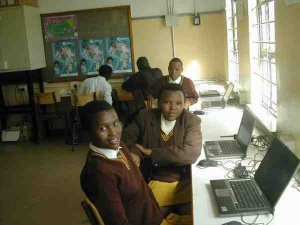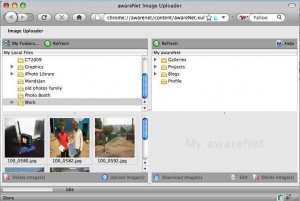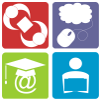Project
The ECSPIRT Project
Eastern Cape Schools Participatory Internet Research and Training Project Background, Goals and MethodsA major problem in African schools is the lack of qualified teachers. In the Eastern Cape alone, 900 Maths and Science teachers are currently being sought. Part of the problem is the large number of rural schools in the province that are relatively isolated and have very bad infrastructure (no power, water or facilities). Such conditions prevail across Africa. Educated people migrate; the teachers do not live in the area and therefore have a long journey to work, which further hinders their reliable continuous presence at school. The ECSPIRT project introduces a two-pronged solution against this complex problem in situations where computers and Internet access are available. Firstly, an ongoing, sustainable and independent training structure is set up. This ensures that generations of scholars receive appropriate training and that the computer lab is used to full capacity. Secondly and parallel to the training programme, the new innovative software awareNet is used to assist the scholars. awareNet is an educational software that is currently being developed by eKhaya ICT, together with the scholars. To set up a sustainable training structure is not trivial. One has to ensure that everyone involved in the training wins, and avoid the trap of demotivating people because funds eventually run out. Hence, payment for the teachers is restricted to bonuses and involves making the learners independent. After an initial phase of additional teacher work and training, the computer lab can effectively be run by the self-organised learners. Instead of focusing the reward on money, the value of the activity itself is promoted, which makes it much more sustainable and this will hopefully have short- and long-term benefits for all the learners in the programme.

Scholars during a computer lesson
The teachers will, during extra-mural classes as well as during the school day, make use of the facilities to train a group of volunteer students in the CAT curriculum according to the course material that the school has purchased. These students will then be tested on their knowledge using an assessment programme that will be loaded on the computers. The bonus to be paid out to the teachers will be equivalent to roughly a third or quarter of a month’s salary, depending on the number of students that attain high marks in the test. Either way the bonus will be a nice addition to their income and will reward them for spending extra time at the school. In the initial phase, Ron Wertlen of eKhaya ICT will spend at least six afternoons at the school with the volunteer group. Further training by eKhaya ICT (approx. three days per month until February 2009) are being co-funded by SELF and the Rhodes University. From within the first student group the leading/ top students will be identified and will receive special training in the following phase. They will be taught by the teachers to supervise and teach the CAT course and also how to use the awareNet software. The champion group will also be most active in helping design the awareNet software. During this second phase regular groups will also receive training so that the champions can watch the teachers and learn how to train from them. We will encourage an approach of individual tutoring within mostly practical sessions, where learners are trained as they use the computers. We believe that this training plan will be very effective as it motivates the learners to work with the computers independently of the teachers, and to take training and organisation of computer usage into their own hands. This will help to increase the computer lab usage as it will not require teachers to be present all the time . Further, it will also motivate the learners and increase their self-confidence, and they will have a nice addition to their CV, which will no doubt help them get jobs when they leave school.
[more]
The software awareNet is modern, interactive education and communication software featuring an intelligent platform that provides semiautomatic monitoring to protect its users. It allows the scholars to communicate with each other in a safe environment, as well as allowing them to create profiles of themselves and projects (content) online portraying their situation or in fact on any topic they like. It will give the learners the opportunity to contact other learners in the near proximity or internationally to exchange experiences and knowledge, and to realise their own mutual projects. It is expected that the learning value of such motivating activities will be tremendous and will lead to the learner’s performance improving considerably as well as the teachers being on site more reliably and continuously. This software awareNet was presented for the first time directly after the first training courses at the Zwelenqaba School on the 29th of January 2009. It initially includes the following functions: - friends network with profiles, status updates, notifications, etc
- discussion forums
- personal and syndicated picture galleries
- blogs and blog aggregation
- instant messaging (chat)
- user messaging (mail)
- image and file management
- shared calendar
- collaborative projects to encourage teamwork.
It is now being developed further in close cooperation with the learners to adapt it precisely to their needs while they learn the basic skills of how to use the computers. This method particularly motivates the learners to cooperate in a focused manner, because changes are visible immediately. Especially interesting is be the fact that awareNet’s functionality is, for a large part, be determined by young inexperienced users. New insights of the perception of young African users may make awareNet a highly popular tool, helping bring Africa onto the Internet in an unprecedented manner and making generations of young Africans more aware of our global community. awareNet is free/libre open source software (FLOSS).
[more]
An important and very interesting part of our work is the creation of an international network of schools, teachers, and learners at school, as well as university students for technical and cultural exchange. To begin with, a cooperation work between the Institute of the Freie Universität Berlin (FUB), eKhaya ICT and The Village Scribe Association developed and implemented the Image Uploader into awareNet (see other Project in awareNet: "Kundenprojekt").

Screenshot of the Image Uploader
In addition, the Village Scribe Association will source European Schools that want to go into partnership with an African School. Such schools ought to already be equipped with the necessary hardware and Internet access. The software will be delivered free of charge by eKhaya ICT. Since curricula in Germany are rather full we assume that communication with African schools will take place in voluntary workshops. Hence, our target groups are motivated learners and teachers who show an interest in Africa.
[more]
span class="Apple-style-span" style="font-family: sans-serif; font-size: 13px; line-height: 19px; "> European learners and teachers do not need to provide any information, i.e. there will be no need for special preparations. The only requirement is sufficient English language proficiency. The initial input will in fact come from the African learners as the project has already begun in South Africa. The goal is not to prepare presentations, but to extract questions and to ascertain interests that can be delivered individually to partners. Everyone interested in a certain topic or question can participate in open discussions, research or running projects. Multimedia (images, sound, video) is used wherever possible. There are no age restrictions. Young learners is given the opportunity to learn from older learners, whilst the older ones can learn by applying their knowledge. Questions, discussions and projects explicitly ought to be ex-cogitated and developed by the learners and teachers, who aside from having a guiding function will not be required to assess or criticise progress. Teachers only need to help with the handling of hardware and software and with the sourcing of information using the Internet. Their role should be to ask the learners questions that will motivate and stimulate them, and teachers should be interested in and open to the learners’ initiative and creativity. In this way, teachers are able to guide their pupils in how to act independently, responsibly, respectfully and democratically. Possible abuse of the Internet is prevented by encouraging such behaviour. Furthermore, through the implementation of a semiautomatic monitoring system that does not infringe on privacy rights, misuse can be detected early. Such a technology is currently been developed by eKhaya ICT in conjunction with this project and facilitates the teacher’s work and render the blocking of certain websites unnecessary.
[more]
|
|

Please log in to view this section.
Their Other Projects 

Please log in to view this section.
|

